It’s been a little while since our last blog but we’re glad to say there is plenty of saving going on out there! This time you can read about: Fantastic finds in Australia * Bristol Rovers * Croydon Common trophy * Sheffield Home of Football * Digitising the Alcock Annuals * Lively start for Swindon Town Museum * Sporting Heritage Football Network * Club Corner – Southport *
The Great Save ‘international conference’!
You need to start somewhere and, rather like the first ever cricket Test, this is an England-Australia match-up. Greg Werner, of The Great Save Australia, is coming to Wembley for the Socceroos’ game against England in October, so we’re planning to meet up and exchange experiences.
Greg’s got off to a brilliant start in Australia by plugging into state-level football authorities. His latest coup was to collect the first tranche of goodies from the family of the doctor who toured with the Australian team to Cambodia for the very first World Cup qualifiers against North Korea. One unusual item from that collection is the official, not public, programme cover, printed on a board cover and secured with coloured yarn! Definitely not for the masses.
Also saved are a couple of items relating to ‘international’ football of the 1920s. Here’s the cover from the programme for the big Sydney reception for the England representative ‘soccer footballers’ of 1925 and the programme from an unlikely match between Tasmania and China in 1923.
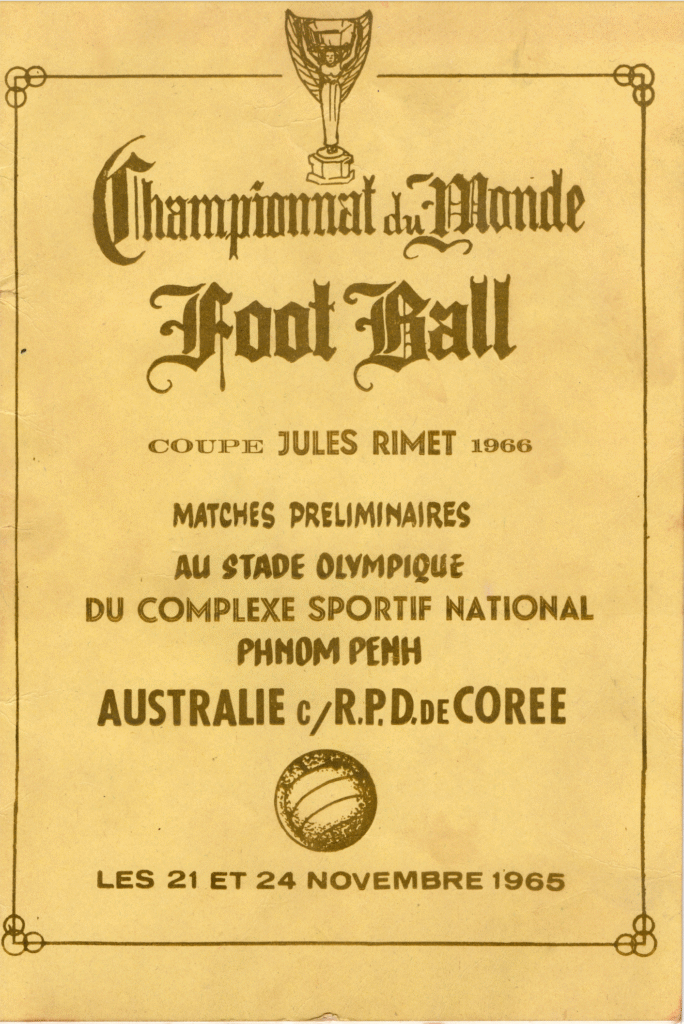
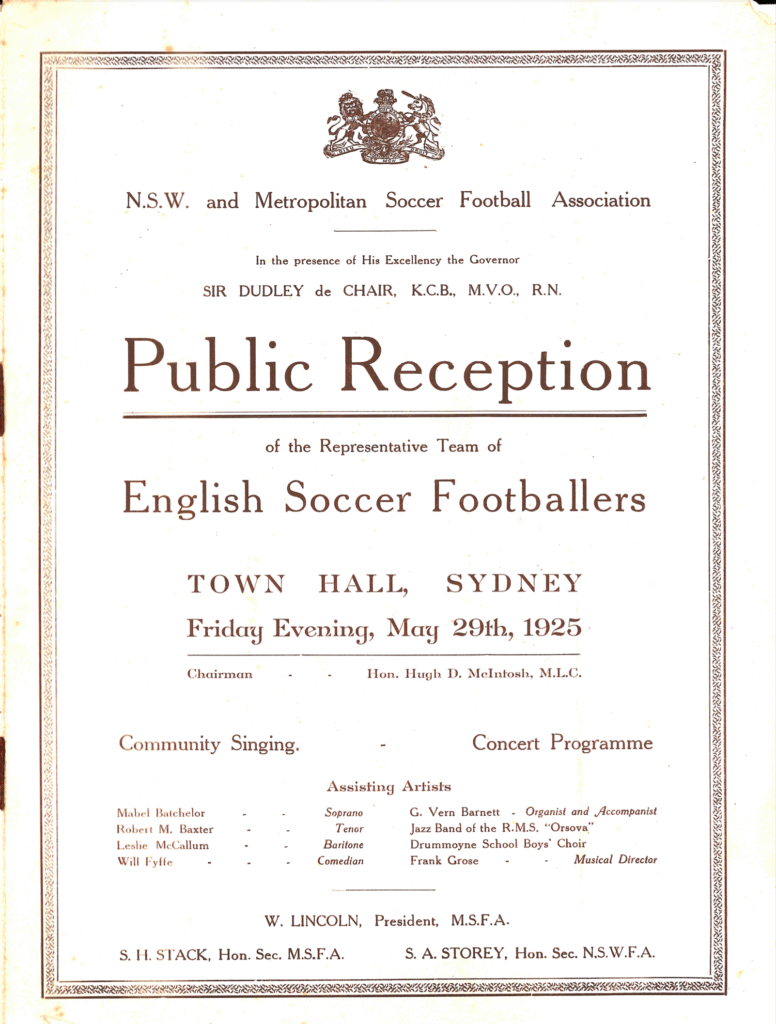
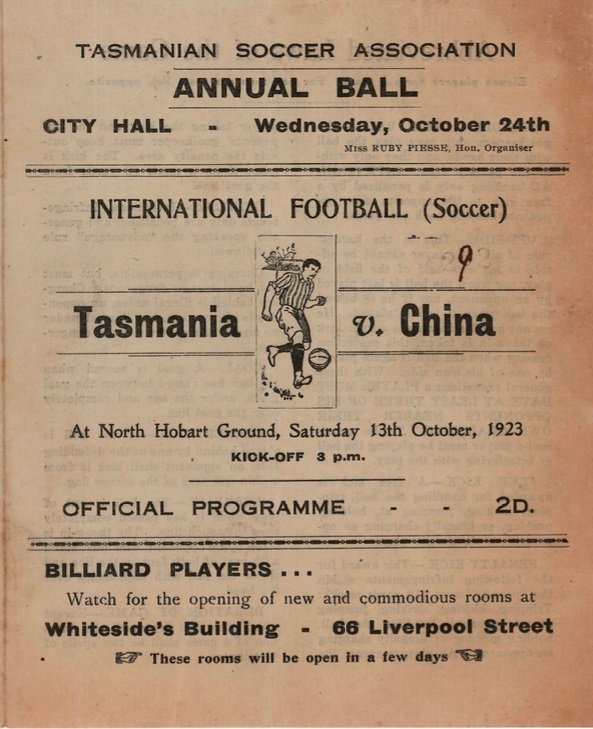
Award-winning Bristol Rovers History Group
Elliott Jackson writes: ‘Bristol Rovers History Group made a successful grant application to celebrate National Sporting Heritage Day. As this date coincides with a Bristol Rovers away game, the funds will be used when the group’s annual History Day is celebrated in December.
Bristol Rovers was formed in 1883 and initially known as the Black Arabs. They took this name due to their predominantly black shirts but only retained it for one season after which it was changed to Eastville Rovers and then to Bristol Rovers.
This year represents Bristol Rovers 140th anniversary, which will be celebrated by both the club and the History Group. Substantial research work on the early days has been documented and is available to both the local community and a wider audience through our website: http://bristolroversmemorabilia.weebly.com/
We are looking to publish the Black Arab research and will put the funding toward this so that hard copies are available for our History Day event.’
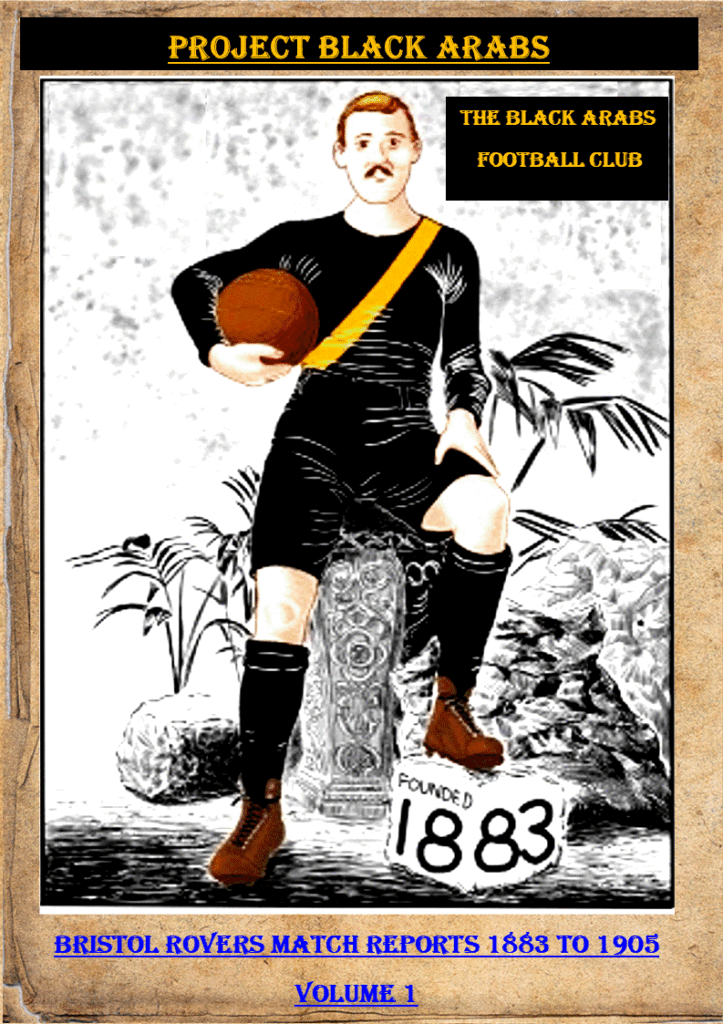
It’s coming home, eventually – the Surrey Herald Cup
Croydon Common, a once significant Southern League club that folded in 1917, won the Surrey Herald Cup in 1905. The trophy had been competed for since 1889-90 but never again. Perhaps because the competition was discontinued? Or perhaps because the cup was ‘spirited away’?
In Alan Futter’s wonderfully comprehensive history of Croydon Common, he tells of how the trophy finally came home. A club official appears to have taken it to Canada in 1912, and in the 1980s a descendant posted it back to Crystal Palace in the mistaken belief that the two clubs were connected. The Palace historian, the late Rev Nigel Sands, contacted Alan as the honorary historian of the extinct club and handed the trophy over – so, very well saved!
If you would like a copy of the book ‘Who killed the Cock Robins?’ Alan’s history of Croydon Common FC, the details can be found here croydoncommon.com/the-book.htm.
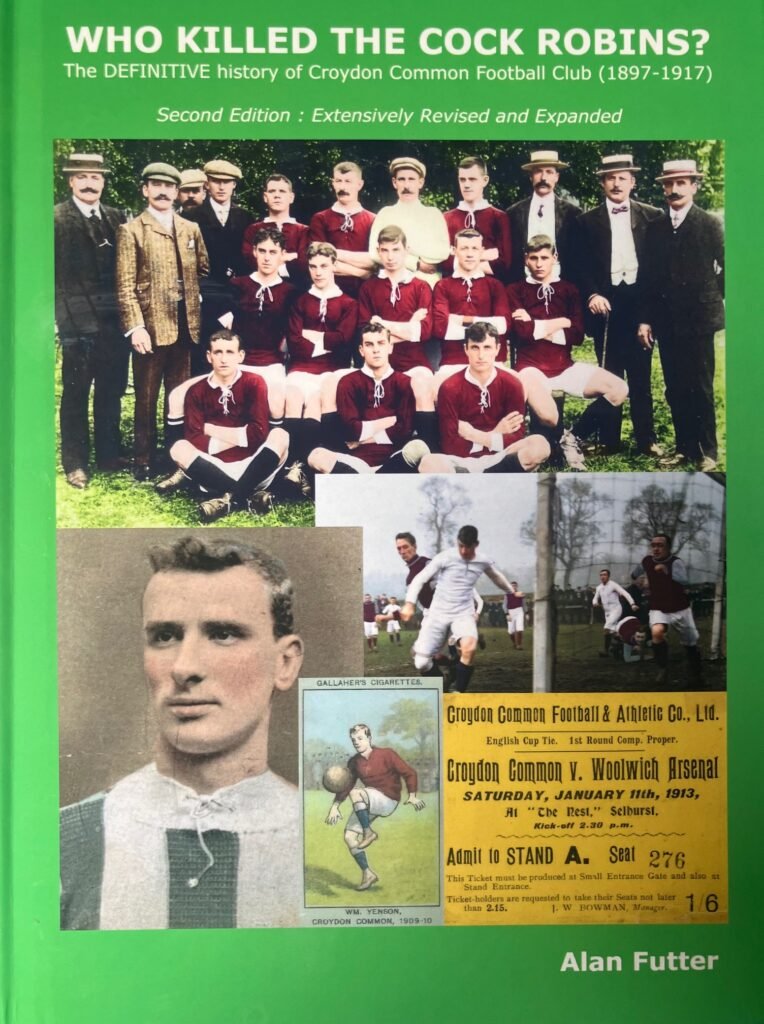
‘Sheffield Home of Football’ is now a registered charity
Sheffield Home of Football (SHOF) was set up a number of years ago to celebrate the city’s unique footballing heritage. Over forty ‘Footballing Firsts’ have been identified as happening in the city.
This year SHOF has been successful in recruiting a new chair and trustees and a cohort of enthusiastic volunteers who have taken up the challenge and are spreading the word both in the city and internationally of its claim to be ‘The Crucible in which the Beautiful Game was forged’!

Thanks to the efforts of the new trustees we now have charity status whose stated mission is to promote a ‘Programme of education and awareness about the city’s footballing history, the creation of a Sheffield Footballing Heritage Museum and the collection of memorabilia, trophies programmes, historical records and other items for digital and physical exhibition’.
A Sporting Heritage Grant for scanning the famous Alcock Football Annuals
One of the founders of SHOF was Martin Westby, a proud son of the city and a great early football historian who wrote ‘A History of Sheffield Football 1857-1889’.
Sadly, Martin passed away in 2020 but he left us a vision for a virtual archive of searchable documents associated with Sheffield and national early football. His reference point for much of his research were the Alcock Football Annuals from 1868 to 1908, a complete run of which is not available in one place. Martin’s ‘goal’ was to create a set of digital scans for research into early clubs and matches.
With the help of collector Phil Martin, we have secured promises of loans of Alcock Annuals from himself, the FA and other collectors, to enable the digitisation of the complete set, using Sheffield City Archive’s hi-resolution scanner. This will kick off the SHOF Digital Archive which will be accessible via our website: https://sheffieldhomeoffootball.org/. Registered Charity no: 1204425.
SHOF was pleased to be awarded a Sporting Heritage Microform Grant to help in funding the Alcock Annual scanning and to help celebrate National Sporting Heritage Day 2023.



Sporting Heritage are proud to support community sporting heritage activity across the UK through a programme of locally focused projects which celebrate National Sporting Heritage Day on 30 September every year. Follow the action @sportinghistory. #NSHD2023
The first lively months of Swindon Town Museum
Paul Hedges updates us on some energetic beginnings for the Swindon Town Football Club Museum Charity, formed earlier this year, as noted in our previous blog.
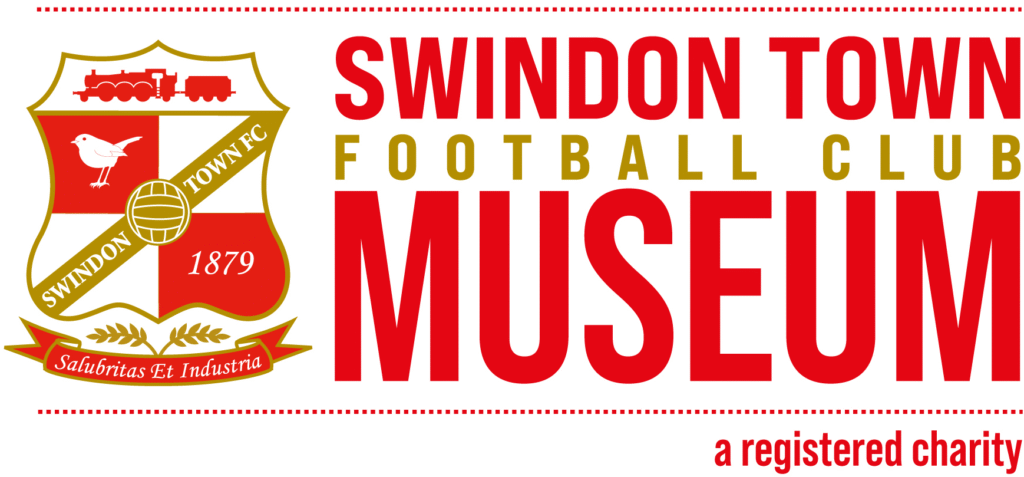
‘John Trollope MBE was officially announced as the first honorary president of the Museum (https://stfcmuseum.org/) at a launch event in July at the County Ground. His achievement of playing 870 league games for Swindon, still a Football League record, was celebrated along with his 80th Birthday.
Local dignitaries including members of parliament, the Mayor and other past players such as Don Rogers, Keith Morgan, Fraser Digby, Paul Bodin & Phil King also attended, funds were raised and great publicity gained.
Subsequently, a number of volunteers were invited by the Club to sort through copious memorabilia and artefacts buried in storage areas not visited for decades. Along with framed international caps for past players there were literally hundreds of old videos and CD’s, signed shirts from the premier league play off and dozens of pictures and trophies.
Together with artefacts already on display at the club, but not previously accurately described, everything is being listed and photographed in readiness for future displays.
It is hoped that match programmes from every past game home and away can be located and so far more than 6,000 have been documented in an attempt to create one copy for display and a duplicate to be archived.
An initiative called the “1969 Project” has started and it is hoped that by March 2024 a documentary will have been created celebrating not only the football achievement of winning the League Cup, beating Arsenal 3-1 in the Wembley final, but featuring personal recollections from fans and the community-wide impact it created.
In addition, work has started on creating a stadium-wide display of key historical moments in the club’s history to enhance match day experience, engage with as many fans as possible and raise the profile of the museum. All this work is as much about preserving the history and heritage of Swindon Town Football Club as it is simply creating a museum.’
Sporting Heritage Football Network
Geoff and Roger attended the September Zoom call of the Sporting Heritage Football Network on 8 September. As always, it was an interesting meeting where people can learn much from what others are doing. Of particular interest to TGS were the different ways in which new heritage societies are being set up.
Daniel Hayes – www.southportfootballclub.co.uk – is single-handedly working on the history of Southport FC, while at the same time assisting the supporters’ trust of the club his son supports, Wigan Athletic, in taking the initial steps towards establishing a heritage society. Read about his work in this issue’s Club Corner.
Digitisation of material was the theme elsewhere – including at Bristol Rovers and Everton. Microform, the sponsors of National Sporting Heritage Day, showcased the preservation, digitisation and web design work they had done with the Huddersfield Town Supporters Trust, which can be viewed at www.htafc-heritage.com and contains 30,000 images across ten thematic collections.
Russell Todd gave news of the upcoming Wales Football Festival in Wrexham 10-11 October, Swansea 12 October, and Cardiff 13-15 October. More details here: https://www.footballfansfestival.com/

If you’d like to join the SH Football Network why not contact Fran Stovold at Sporting Heritage, email to fran@sportingheritage.org.uk. The meetings are approximately quarterly.
Club Corner – Southport

This issue we hear from Daniel Hayes at Southport Central Southport Central (southportfootballclub.co.uk)
Q: What’s the formal status of your heritage group and which groups are involved?
A: I don’t know whether my situation is unusual or not, but there is no “group”. Southport Central is just me. What I’m able to achieve, and the timescales in which I can achieve it, is constrained by the fact that this entire project is being undertaken solo. There is no operating supporters’ trust or supporters’ group at the club, and no funding. Furthermore, the club itself has very little interest in what came before the current incumbents set foot in the building, so there’s been no offer of support whatsoever. Ironically, having researched the origins of the club and discovered the links with cricket and rugby, the rugby club have been really welcoming and keen for me to become involved with them. Thankfully, I have been supported in some of my recent activities by the Southport Townscape Heritage Project, and people who I met through Footycon, who have been a constant source of encouragement. Other local historians have also reached out to offer support even though their own focuses are not on sport.
Q: How did you get started?
A: I first got interested in the history of Southport FC in the mid-1990s when Geoff Wilde and Mike Braham published a book on the Football League history of the club. The club itself has a habit of only ever referring to events post-1978, the year they left the Football League, and there was no single source that covered the whole history. I wanted to know more about the period before the club entered the League in 1921 and over time that research snowballed into creating a website which, as it stands today, is undeniably the most complete record in existence of games played by the club, dating back to its birth, and even the amateur clubs that came before it.
Q: How much stuff have you got?
A: I have a pretty complete set of programmes dating back to around 1955, plus a large collection of newspaper reports, team sheets etc.
Q: How do you make it available for public view?
A: My primary aim was to make the information available, and I’m pleased to be able to say that the website has grown steadily over the past five years or so to the point where it is certainly the most complete documented set of records publicly available. My plan is to follow that up by including, for as many games as possible, newspaper reports and scanned programmes for each game. That however is very time-consuming and has been sidelined somewhat by continued research into some of the more “forgotten” periods of history for the football and rugby clubs.
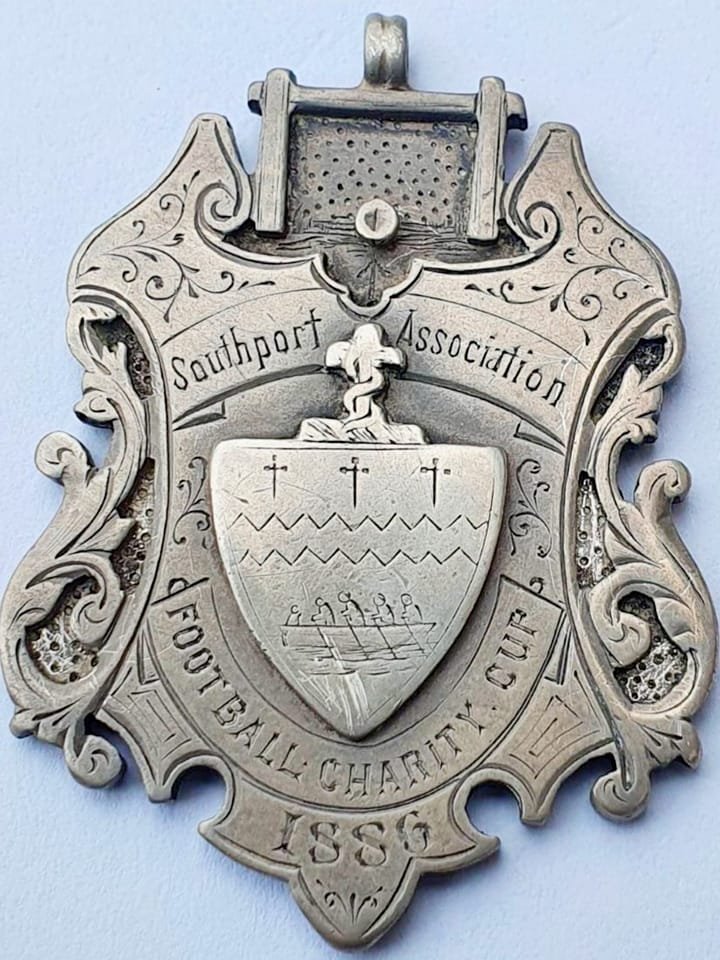
Q: What’s the best / most unusual memorabilia find?
A: I have a medal from the 1886 Southport Charity Cup Final which was the last competitive game played by the original Southport Football Club, one of the ancestral amateur clubs – the first association club in the town.
Q: What piece of advice would you offer people trying to set up a group like yours?
A: Reach out to fellow club historians, or experts within their field. You’ll find 99% of them go out of their way to help.
The Great Save resources
We’ve created what we’ve called The Great Save ‘Taxonomy of Football Memorabilia’. In other words, a list – of the kinds of items we believe are more or less valuable in terms of requiring preservation and / or making a collection. It’s a downloadable PDF here.
We’ve also compiled The Great Save ‘Beginner’s Guide to the Different Types of Football Heritage Entity’ you might set up with some real world examples drawn from our blog posts. It’s a downloadable PDF here.
And finally …
We’re very happy to take feedback, reader contributions and additional information through any of these three channels: via the Comments section below, by email to thegreatsave@icloud.com or via Twitter @TheGreatSave1
Do please sign up to our emails! Even though we’re on Twitter, we do see The Great Save primarily as an informative and campaigning blog best viewed on something other than a mobile phone! If you’d like to get our emails direct to your inbox, let us know here:


Leave a Reply